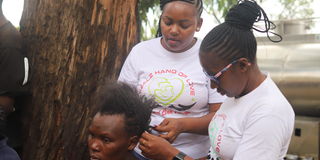Concern as the number of street kids in Nakuru increases

A street boy getting a haircut from Jimmy Jey the owner of the Jimmy Jey barbers in Nakuru during the sherekea mtaani event.
At the age of three, Prince Muchiri knew that the man his mother was married to was not his biological father.
This was due to the constant abuse and mistreatment he and his mother endured at the hands of his drunken stepfather.
Muchiri's name was rarely left out of any argument between his parents, and his presence seemed to catalyse his father's anger towards his mother.
To save his mother from the regular beatings, Muchiri decided to leave home and his next stop was the streets of Nakuru town.
Life at home was tough, but he discovered that life on the streets was even worse, with no shelter, food or security.
Still traumatised by his experiences at home, Muchiri faced a culture shock on the streets where no one cared about his tender age, needs or welfare.
He was bullied by the old street boys, forced to sell drugs and borrow money from the public, and made to surrender everything to them.
"I had no food, no clothes and no place to sleep. The boys bullied me every day, as if they were punishing me for running away from home. But I had nowhere else to go, so I had to do as they asked," said Muchiri.
He remained on the streets for two years before being rescued by a well-wisher, the Naivasha Children's Shelter, where he stayed for eight years.
While at the children's home, he was enrolled in a primary school where he managed to study up to Grade Eight.
After completing primary school, the organisation returned him to his family in an attempt to reconcile and reunite the family.
But their efforts were in vain as his relationship with his stepfather was irretrievably broken.
"We just could not coexist in the same environment with the stepfather. He used to say that I was a grown man and that I should take care of myself, so he would beat me and chase me out of the house," Muchiri said.
The hostility became so intense that at one point Muchiri had to run for his life after his stepfather allegedly threatened to cut him with a panga.
"I had to live in the chief's office for some time before I returned to the streets of Nakuru town," says Muchiri, now 21.

A street girl getting her hair done during the sherekea mtaani event on new years day in Nakuru.
It was there that he met Nancy Ndegwa during one of her initiatives to help street families in Nakuru.
Through her Sherekea mtaani initiative, Ms Ndegwa celebrates the festive season with street families and the less fortunate by organising free food distribution, hairdressing and barbering services, mentoring and counselling to help decongest the streets.
She rented a house for Muchiri and helped him get into a deejaying school in Nakuru. Muchiri is now a deejay and recording artist who has already produced an album.
His latest song on YouTube is 'Wasted' and he goes by the stage name Kushtaggie.

Realzhands of hope founder Nancy ndegwa addressing the press during the Sherekea mtaani event.
At this year's event, Ms Ndegwa, the director and founder of Realzhands of love, in partnership with other organisations including Madini Waters, held the fourth Sherekea Mtaani event where the street families were given free New Year treats.
Ms Ndegwa noted that the aim of the initiative was to rescue the street families and help them reunite with their families.
She, however, regretted that the number of street families is increasing especially in the areas of Molo, Giligil and Rongai sub-counties.
According to her, factors contributing to the rising numbers include high levels of family poverty, family breakdown, mental illness, drug addiction and the emergence of slums, among others.
"According to the census conducted by the organisation on September 26, 2024, there were a total of 1367 street children. 1322 males and 45 females, 841 adults, 526 children. The total number of street children in October 2023 was 1107," said Ms Ndegwa.

Madini waters limited director Nancy Njuguna.
Madini Waters Limited director Nancy Njuguna said the company has been providing free purified water to the street children in Nakuru.
"We realised that Nakuru has a water problem, so we decided to provide free purified water to street children in the county, while providing employment to those who show signs of reformation," said Ms Njuguna.

